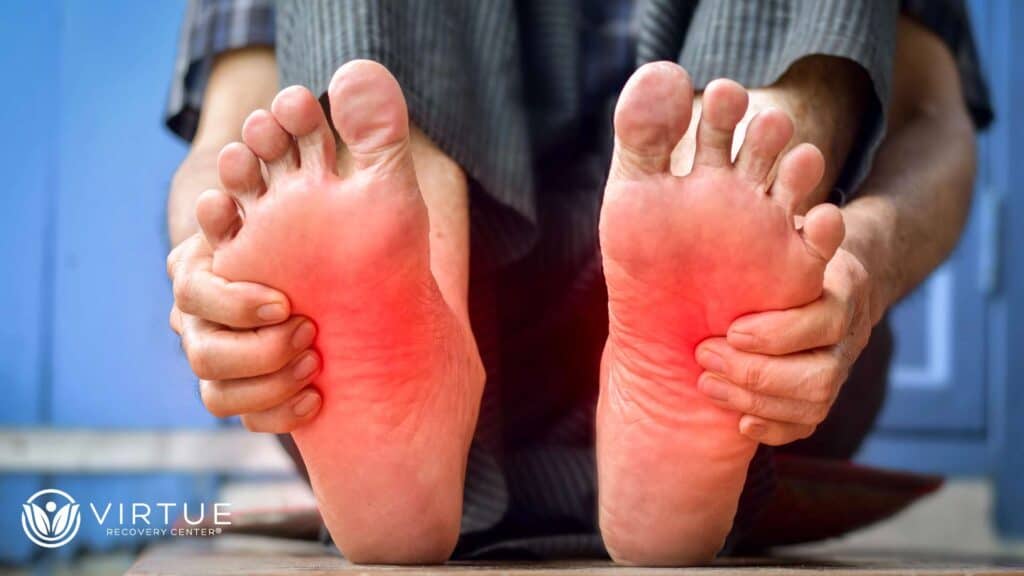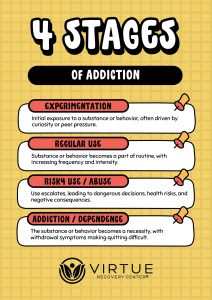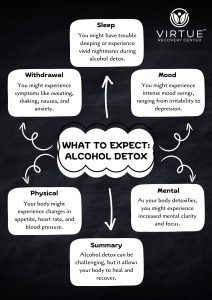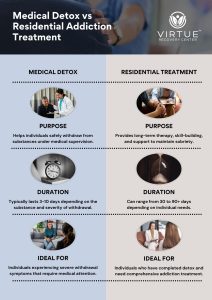Key Takeaways:
- Alcoholic neuropathy results from chronic alcohol consumption and causes nerve damage, especially in the arms and legs.
- Recovery time can vary depending on how long someone has been drinking, the severity of the damage, and treatment.
- Abstaining from alcohol, improving nutrition (especially B vitamins), and undergoing physical therapy are crucial to recovery.
- While symptoms can improve, full recovery may take months or longer, and some damage may be irreversible.
Introduction
Alcoholic neuropathy is a condition caused by long-term alcohol use that damages the peripheral nerves. These nerves send signals between the brain, spinal cord, and the rest of the body. When alcohol is consumed heavily over time, it can interfere with the body’s ability to absorb essential nutrients like vitamin B1 (thiamine), leading to nerve damage. The result? Pain, tingling, and limb weakness can affect the quality of life. But how long does it take to recover from alcoholic neuropathy? And is full recovery possible? This article explores the process and what you can do to improve your chances of healing.
Understanding Alcoholic Neuropathy
Alcoholic neuropathy affects the peripheral nervous system, which includes the nerves outside the brain and spinal cord. When alcohol is consumed in large quantities over a long period, it causes both direct and indirect damage to these nerves. Alcohol is toxic to nerve cells, and its presence can impair the way nerves function. Additionally, chronic alcohol consumption often leads to nutritional deficiencies, especially of vitamins like thiamine, which are vital for nerve health.
Thiamine deficiency plays a significant role in alcoholic neuropathy. This vitamin is crucial for proper nerve function; without it, nerves become damaged and may not regenerate properly. As a result, people with alcoholic neuropathy experience symptoms such as tingling, burning sensations, numbness, and muscle weakness, particularly in the arms and legs.
Symptoms of Alcoholic Neuropathy
The symptoms of alcoholic neuropathy vary based on the extent of nerve damage. Here are the most common ones:
- Pain and discomfort: Many people with alcoholic neuropathy experience sharp or burning pain, especially in their hands and feet.
- Numbness and tingling: This “pins and needles” sensation can make it difficult to sense hot or cold, leading to an increased risk of injury.
- Muscle weakness: The weakening of muscles, particularly in the legs, can make walking and maintaining balance difficult.
- Loss of coordination: As the nerves controlling movement are affected, people may find it hard to maintain their arms and legs.
- Digestive problems: Alcoholic neuropathy may affect autonomic nerves, which control bodily functions such as digestion. This can lead to issues like constipation or diarrhea.
Recovery from Alcoholic Neuropathy
The recovery timeline for alcoholic neuropathy is different for everyone. Several factors influence how long it will take for symptoms to improve, such as the severity of nerve damage, how long alcohol was consumed, and the effectiveness of treatment.
Factors That Affect Recovery
- Length of alcohol use: The longer someone has consumed alcohol excessively, the more severe the nerve damage is likely to be.
- The severity of nerve damage: Early-stage neuropathy may respond better to treatment, while severe cases might result in permanent damage.
- Medical interventions: Treatment to replenish essential nutrients like thiamine and other B vitamins can help repair nerve damage. Physical therapy may also strengthen muscles and improve coordination.
- Abstaining from alcohol: The most crucial step in recovering from alcoholic neuropathy is to stop drinking. Continued alcohol use will prevent the nerves from healing and may lead to further damage.
Treatment Timeline
- Early stages: If caught early, symptoms of alcoholic neuropathy can begin to improve within a few months of quitting alcohol. Patients may feel less pain, and their muscle strength may gradually return.
- Moderate to severe cases: For more advanced neuropathy, it may take over a year to see significant improvements. The damage may be irreversible in some cases, but treatment can still help manage symptoms and prevent further deterioration.
Preventing Further Nerve Damage
The best way to prevent further nerve damage and improve symptoms is to stop consuming alcohol. By quitting, your body can heal and prevent additional nerve harm. Additionally, improving your diet with nutrient-rich foods, especially those high in thiamine, can significantly boost your recovery.
Healthcare providers often recommend vitamin supplements and physical therapy to improve muscle strength and coordination. Pain management strategies, such as medications and lifestyle changes, may also be helpful for those experiencing chronic discomfort.
Living with Alcoholic Neuropathy
Even with the best treatments, some people may continue to experience nerve damage symptoms. To manage the condition, it’s essential to adapt to daily life. Physical therapy can help improve balance and muscle strength, while pain relief options, such as medications and alternative therapies, may ease discomfort. Regular follow-ups with healthcare providers are crucial to monitor the condition and adjust treatments.
Conclusion
Recovering from alcoholic neuropathy takes time, patience, and effort. The sooner someone stops drinking and seeks treatment, the better their chances of healing and preventing further damage. While full recovery is possible for some, others may need ongoing treatment to manage symptoms. Regardless of the severity of your condition, it’s never too late to seek help.
If you or a loved one is struggling with alcohol addiction and facing alcoholic neuropathy, professional help is available. Contact Virtue Recovery Las Vegas at 866-520-2861 for support, treatment, and guidance on your path to recovery.
FAQs About Alcoholic Neuropathy
What is alcoholic neuropathy?
Alcoholic neuropathy is a condition where excessive alcohol consumption damages the peripheral nerves, leading to pain, tingling, and muscle weakness.
How long does it take for alcoholic neuropathy to improve?
Recovery time varies depending on the severity of the condition. Early cases may see improvement in a few months, while severe cases can take over a year, and some damage may be irreversible.
Can alcoholic neuropathy be cured?
While it is difficult to reverse all the nerve damage, symptoms can improve significantly with proper treatment, including quitting alcohol and addressing nutritional deficiencies.
What are the symptoms of alcoholic neuropathy?
Common signs include pain, numbness, tingling, muscle weakness, and balance issues. Digestive problems and difficulty walking may also occur.
How can alcoholic neuropathy be treated?
Treatment includes abstaining from alcohol, taking vitamin supplements, physical therapy, pain management, and working with medical professionals to monitor the condition.
How long does alcoholic neuropathy last?
The duration of alcoholic neuropathy varies depending on the severity of nerve damage and how quickly alcohol intake is stopped. While some neuropathic symptoms may improve with abstinence, in severe cases, the nerve damage can be long-lasting or even permanent.
How do you get alcohol-induced neuropathy?
Alcohol-induced neuropathy develops due to the toxic effect of alcohol on nerve tissue combined with malnutrition, particularly vitamin B deficiencies. Heavy, long-term alcohol consumption damages both the central nervous system and peripheral nerves, leading to neuropathic symptoms.
How do you prevent alcoholic neuropathy?
Preventing alcoholic neuropathy involves reducing or eliminating alcohol intake and maintaining a healthy diet rich in vitamins, especially B vitamins. Early intervention and management of alcohol-related neuropathy can stop the progression of nerve damage.
How much alcohol consumption does it take to develop alcoholic peripheral neuropathy?
There is no exact threshold, but heavy, prolonged alcohol use over many years significantly increases the risk of developing alcoholic peripheral neuropathy. The risk depends on factors such as individual tolerance, overall health, and duration of alcohol intake.
What are the neurological effects of alcoholic neuropathy?
Alcoholic neuropathy causes nerve damage that results in numbness, tingling, burning sensations, muscle weakness, and chronic pain. It can also impair motor nerve functions, affecting coordination, balance, and walking ability.
What is the treatment for alcoholic neuropathy?
Treatment for alcoholic neuropathy includes stopping alcohol intake, managing pain through medications and physical therapy, and addressing vitamin deficiencies through supplementation. In some cases, pain management may also involve the use of neuropathic pain medications.
How does one go about diagnosing alcoholic neuropathy?
Diagnosing alcoholic neuropathy typically involves a detailed medical history review, neurological exams, and tests like nerve conduction studies to assess the extent of nerve damage. Blood tests are often conducted to check for vitamin deficiencies and alcohol-related damage.
What treatment options are there for alcohol addiction?
Treatment options for alcohol addiction include detoxification, inpatient or outpatient rehab, therapy (like Cognitive Behavioral Therapy), support groups, and medication-assisted treatment. Long-term recovery often involves continued counseling and relapse prevention programs.
What are the toxic effects of alcohol neuropathy?
The toxic effects of alcohol neuropathy include progressive nerve damage, chronic pain, loss of sensation, muscle weakness, and impaired motor function. Continued alcohol consumption can worsen these effects and may lead to permanent disability.
How long does alcoholic neuropathy take to go away completely?
Recovery time for alcoholic neuropathy varies widely based on the severity of nerve damage and whether the individual abstains from alcohol. In mild cases, symptoms may improve within months, but the damage may be irreversible in more severe cases.
Can neuropathy be reversed?
Neuropathy can be partially reversed if treated early and alcohol consumption is stopped, but in advanced cases, the nerve damage may be permanent. Early intervention is key to improving outcomes and managing symptoms.
Is alcoholic myopathy reversible?
Yes, alcoholic myopathy, which involves muscle weakness and wasting due to chronic alcohol use, can be reversible with complete cessation of alcohol. Proper nutrition and physical therapy can help improve muscle function over time.
What drink is good for neuropathy?
Water and beverages rich in vitamins, particularly B vitamins (e.g., fortified juices), can support nerve health. Avoiding alcoholic beverages is crucial for managing and preventing further neuropathy progression.
Is alcoholic neuropathy a disability?
Yes, alcoholic neuropathy can become a disability, especially in severe cases where nerve damage leads to significant pain, loss of function, and mobility issues. It can impact a person’s ability to perform daily tasks and work.
What does alcoholic myopathy feel like?
Alcoholic myopathy causes muscle weakness, cramping, and stiffness, often leading to difficulty with movement and physical tasks. Patients with alcoholic myopathy may experience fatigue and muscle pain, especially after physical activity.
Should you wear socks to bed with neuropathy?
Wearing socks to bed can help warm your feet and reduce discomfort for individuals with neuropathic pain. However, it is important to ensure socks are tight, as poor circulation can worsen neuropathy symptoms.
Is alcoholic neuropathy permanent?
Alcoholic neuropathy can be permanent if the nerve damage is severe and alcohol intake continues. While some symptoms may improve with alcohol cessation and proper treatment, long-term damage may remain in advanced cases.
Can Dry Drunk Syndrome Contribute to the Duration of Alcoholic Neuropathy?
Understanding the concept of the dry drunk is crucial when examining the duration of alcoholic neuropathy. Dry drunk syndrome, characterized by the continued behavioral patterns of alcoholism even after sobriety, can contribute to prolonged nerve damage and worsen the effects of alcoholic neuropathy. It’s essential to address this aspect in treatment.













